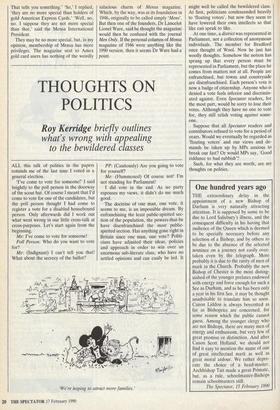THOUGHTS ON POLITICS
Roy Kerridge briefly outlines
what's wrong with appealing to the bewildered classes
ALL this talk of politics in the papers reminds me of the last time I voted in a general election.
'I've come to vote for someone!' I said brightly to the poll person in the doorway of the scout hut. Of course I meant that I'd come to vote for one of the candidates, but the poll person thought I had come to register a vote for a disabled housebound person. Only afterwards did I work out what went wrong in our little cross-talk at cross-purposes. Let's start again from the beginning.
Me: I've come to vote for someone! Poll Person: Who do you want to vote for?
Me: (Indignant) I can't tell you that! What about the secrecy of the ballot? PP: (Cautiously) Are you going to vote for yourself?
Me: (Flummoxed) Of course not! I'm not standing for Parliament!
I did vote in the end. As no party espouses my views, it didn't do me much good.
The doctrine of one man, one vote, it seems to me, is an impossible dream. By enfranchising the least public-spirited sec- tion of the population, the powers-that-be have disenfranchised the most public- spirited section. Has anything gone right in Britain since one man, one vote? Politi- cians have adjusted their ideas, policies and approach in order to win over an enormous sub-literate class, who have no settled opinions and can easily be led. It 'We're hoping to attract more families.' might well be called the bewildered class. At first, politicians condescended heavily to 'floating voters', but now they seem to have lowered their own intellects so that like can speak to like.
At one time, a district was represented in Parliament, not a collection of anonymous individuals. The member for Bradford once thought of Wool. Now he just has woolly thoughts. Somehow the notion has sprung up that every person must be represented in Parliament, but the place he comes from matters not at all. People are enfranchised, but towns and countryside are disenfranchised. Each person's vote is now a badge of citizenship. Anyone who is denied a vote feels inferior and discrimin- ated against. Even Spectator readers, for the most part, would be sorry to lose their votes. Although they have no one to vote for, they still relish voting against some- one.
Suppose that all Spectator readers and contributors refused to vote for a period of years. Would we eventually be regarded as 'floating voters' and our views and de- mands be taken up by MPs anxious to break our fast? Or would MPs say, 'Good riddance to bad rubbish'?
Such, for what they are worth, are my thoughts on politics.


















































 Previous page
Previous page